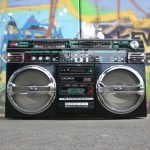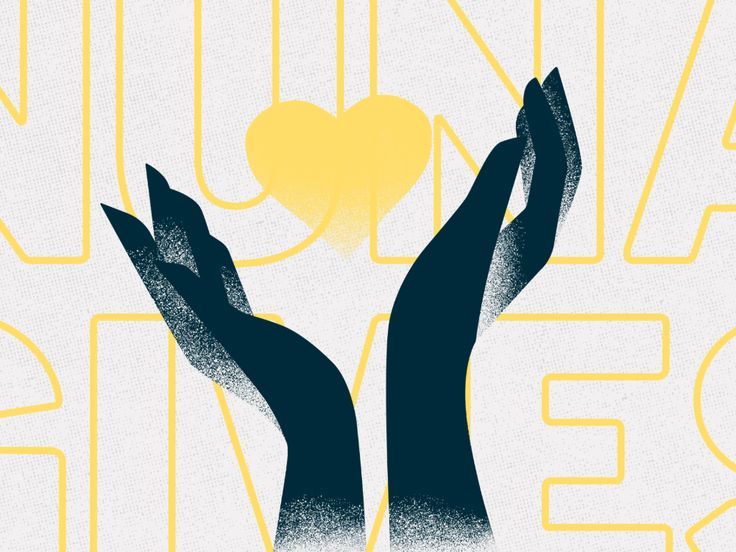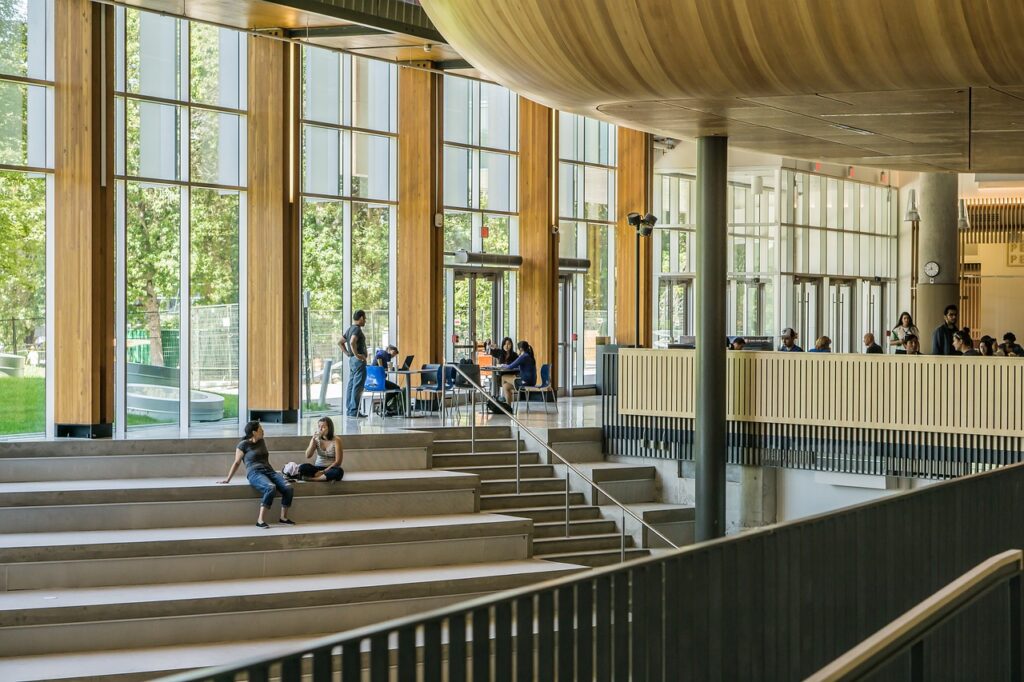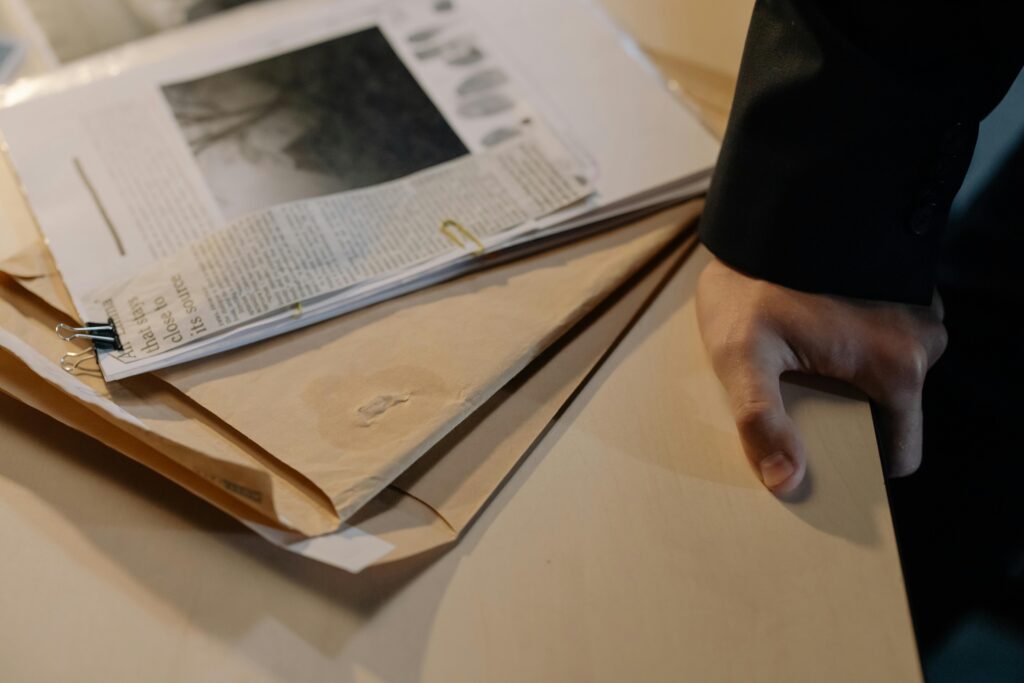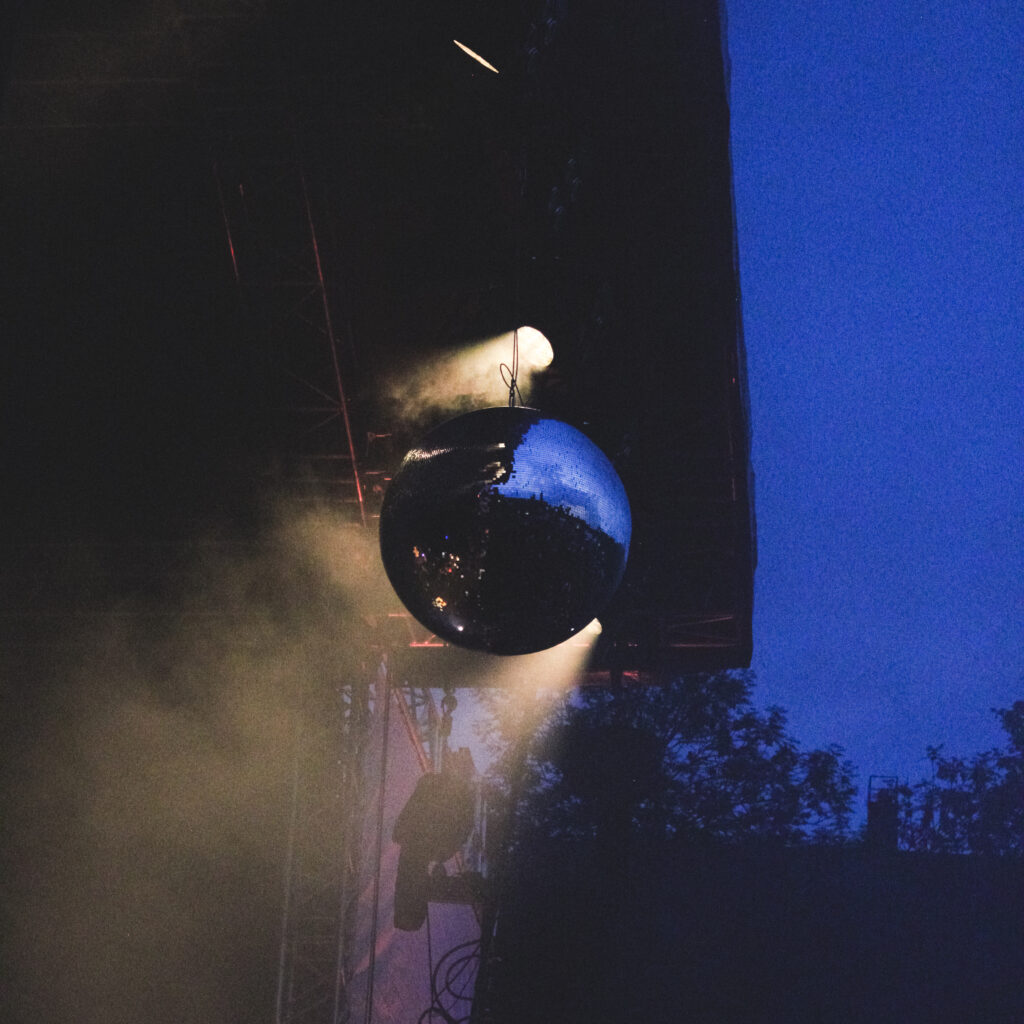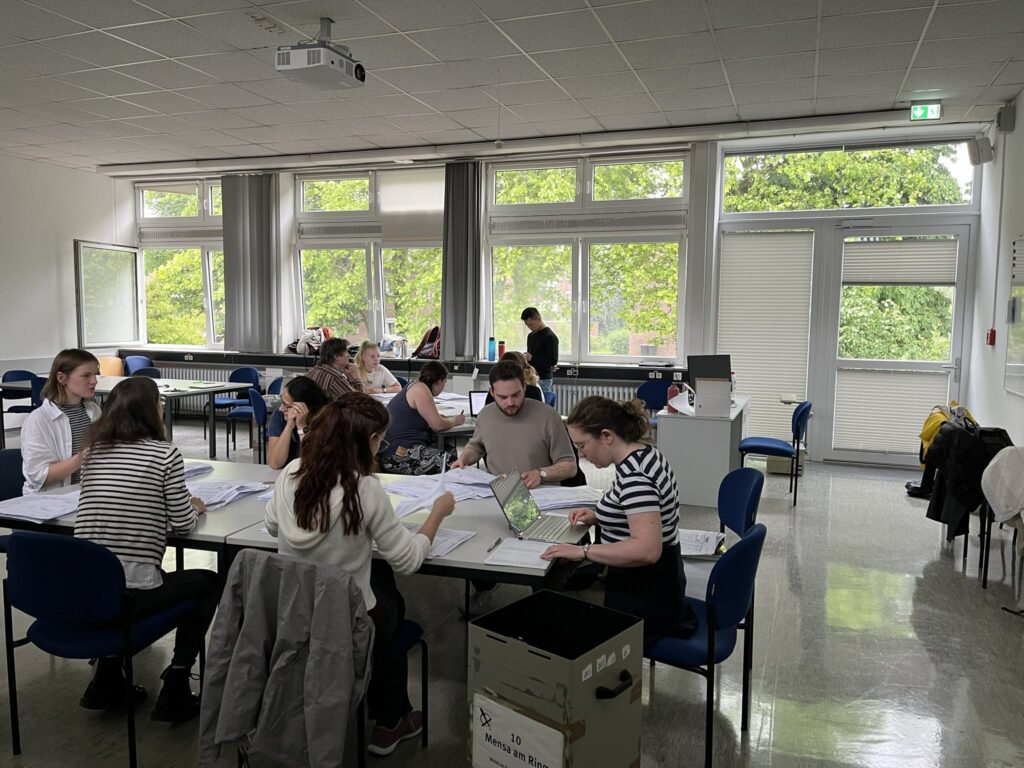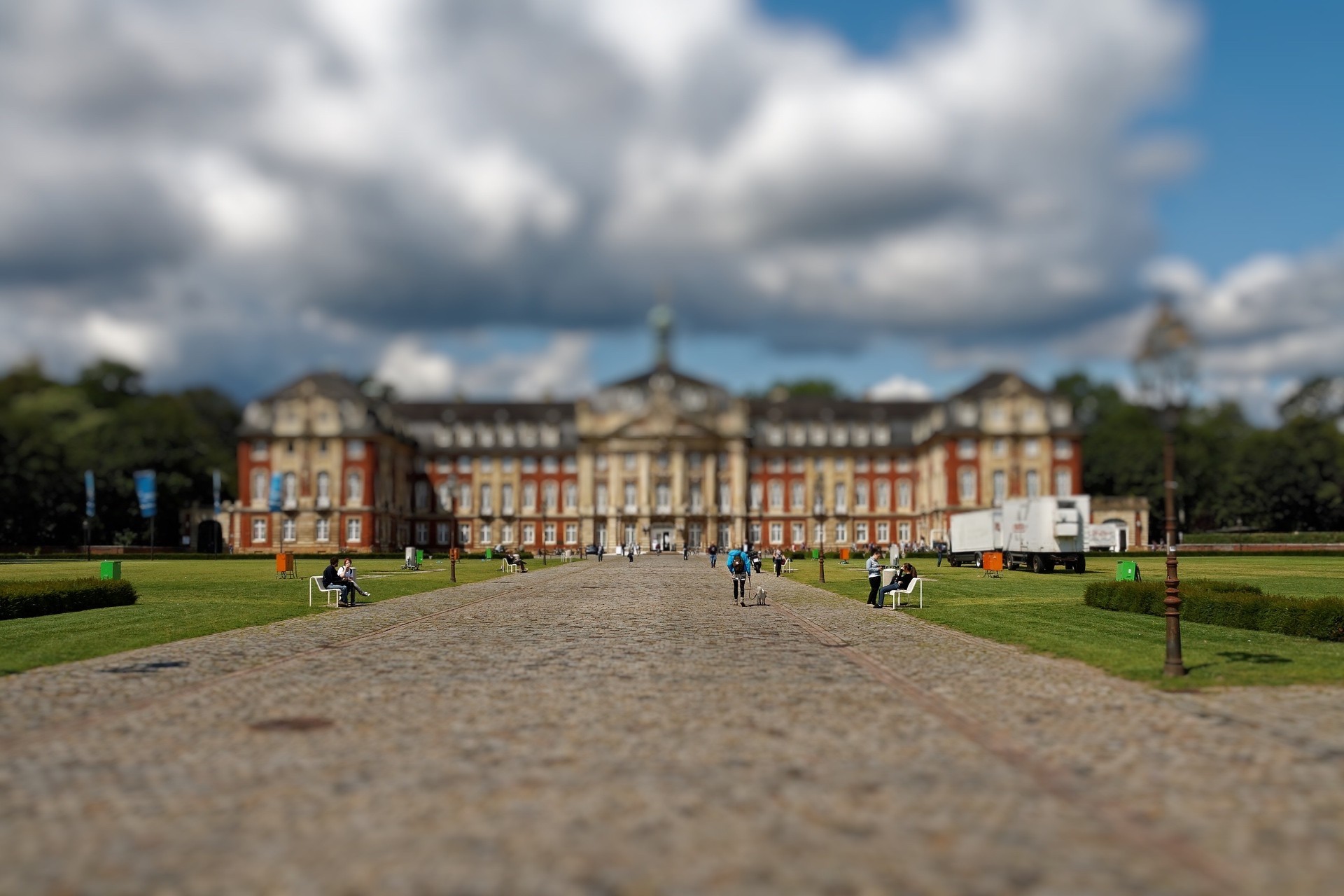„Everything is about making the show as good as it can be“ – Tord Øverland Knudsen von The Wombats im Interview
Written by Carlotta Aupke on 11. Juni 2025
“When you look at the ocean, it’s very rarely that you actually take it in” – genau dieser Gedanke war titelgebend für “Oh, the Ocean“, das mittlerweile sechste Album der britischen Indie-Rock Band The Wombats. Unsere Musikredakteurinnen Carlotta Aupke und Anika Hagen haben mit Tord Øverland Knudsen von The Wombats darüber gesprochen, was die DNA von The Wombats eigentlich ausmacht, wie die drei sich nach 20 Jahren Banderfahrung auf ihre Konzerte vorbereiten und welchen unvergesslichen Moment Tord in Münster erlebt hat.
Carlotta: Hi. I’m Carlotta and next to me is Anika.
Tord Øverland Knudsen: Hi.
Carlotta: And right now we are at Jovel with Tord Øverland Knudsen. I hope I pronounced that correctly.
Tord Øverland Knudsen: Well, yeah, that was pretty good. I mean, I guess Norwegian and German have similarities. It’s easy for you guys. It’s more difficult for the guys from England to say that correctly.
Carlotta: That’s good. So you’re halfway through your mainland Europe tour. How has tour life treated you so far?
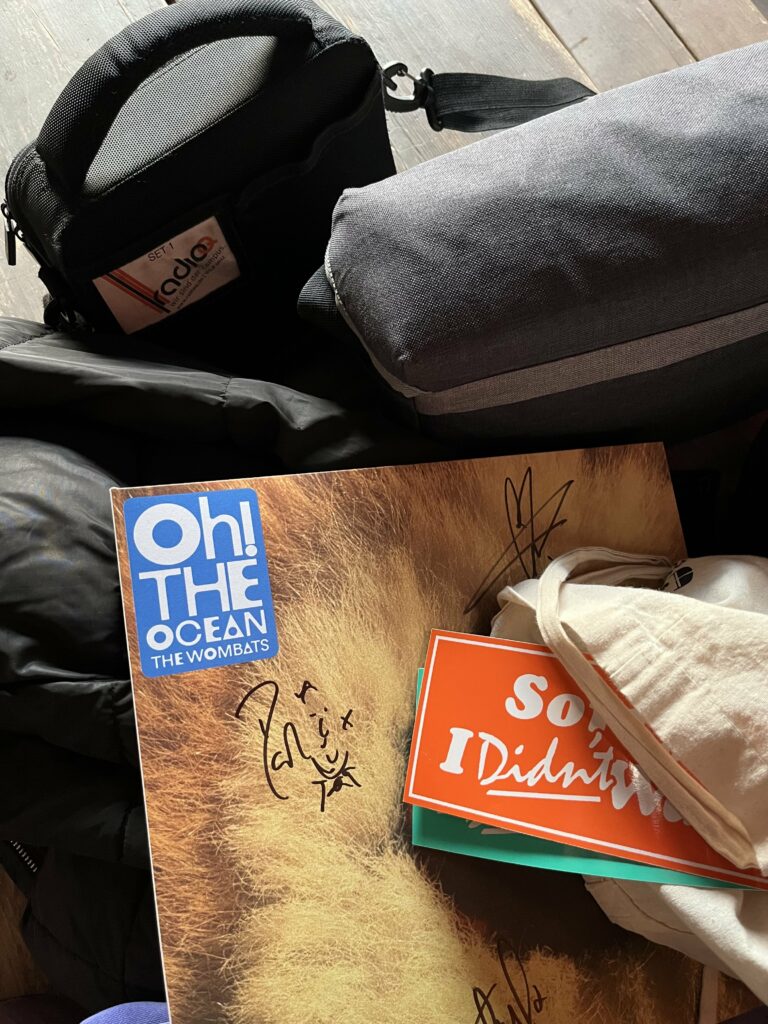
Tord Øverland Knudsen: It’s been so good. Yeah, really great to be back on the road and obviously playing all the new songs, specifically getting them out to the fans and to get them into the world of live music, they only just exist on laptops and in the studio until it’s out in the world. And then obviously we don’t know how they’re going to be received by people and stuff. But the reception has been really good. So, yeah, it’s been really, really great.
Carlotta: That’s so nice. And you keep coming back to Münster. Do you have any memories of the city or do you like anything specific about Münster?
Tord Øverland Knudsen: I do remember something specific that happened at a show here and it was one of our guitar techs. He was dressed full in like a skirt and a wig and full on makeup and he knelt in front of Murph. I think it was through the song „Isabel“.
Carlotta: Oh, I remember that.
Tord Øverland Knudsen: And they kissed.
Carlotta: I remember that! I think I was at the show.
Tord Øverland Knudsen: Yeah, that’s one of the things that I really strongly remember from this place because those photos have been sent around or, you know, been existing. And it’s kind of one of those memorable moments. But yeah, this is the third time I’ve been here, I think. And as I told you before, I’ve been walking around town and it’s a beautiful place. It’s a really nice place to come and visit but unfortunately this time I was a bit tired, so just enjoying the sun. It’s been a beautiful day.
Carlotta: Yeah, I think Münster is excited for the new songs. Moving on to your new album: the album title “Oh! The Ocean” kind of sets the theme for the record. I think your lead singer, Matthew Murphy, said that as he stood at the beach, he felt like seeing the ocean for the first time and getting out of his head. Did you start creating the album around this realisation or was that just a natural progression?
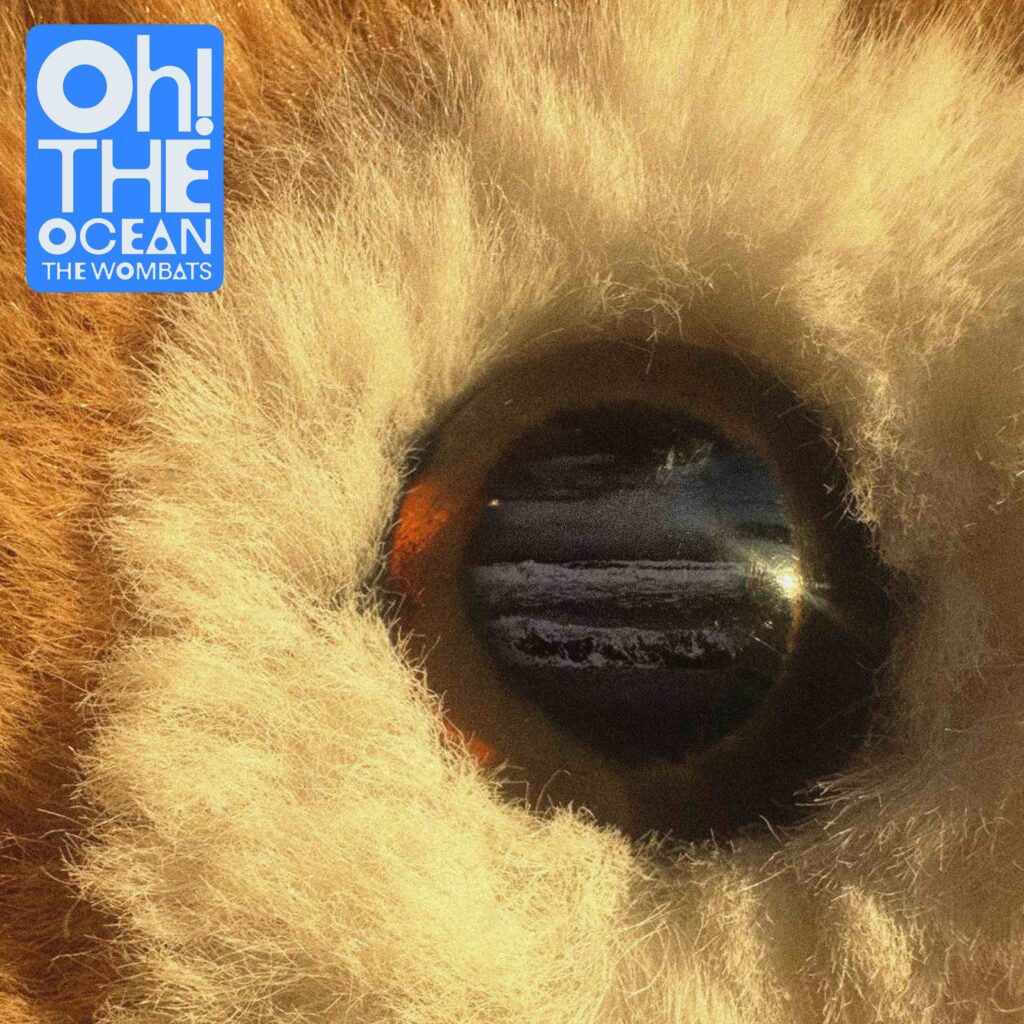
Tord Øverland Knudsen: That actually happened after. It was kind of more like, „oh, that’s fitting to some of the topics on the album and in the songs“. But yeah, you often forget to be in the moment. I guess it’s one of those things that it tries to touch upon, because when you look at the ocean, it’s very rarely that you actually take it in. Like, this is absolutely crazy what’s out there. That’s insane. You know, really, if you think about the sheer size of it, like, what’s in it. And it’s not actually fully appreciating how awesome it is, I guess. And to be mentally in that moment fully and not be anywhere else in your head, because that’s often what we’re guilty of as human beings, you are somewhere or do something, but you’re thinking about your next thing or you’re somewhere else in your head constantly. So to be present in the moment, I guess it’s kind of the meaning with it somehow.
Anika: Having this album is maybe a good reminder for you guys to always keep that in mind.
Tord Øverland Knudsen: Yeah.
Anika: „Oh! The Ocean“ has this classic The Wombats sound and it does show quite a few similarities to your first album „A Guide to Love, Loss and Desperation“, especially with the instrumental parts. Do you feel that with your new album you’ve come back to your origins in a way?
Tord Øverland Knudsen: Not fully. I feel like with all the experience of the other albums, they obviously are very much a part of our DNA at this point. But I think the approach was a little bit more similar in many ways. Like how everything was kind of recorded semi-live, like me and Dan and Murph will actually play together a lot of the time. And the songs weren’t massively rehearsed or it wasn’t demos that we tried to 100% recreate. That was kind of partially the producer John Congleton’s sort of doing because he doesn’t like demos. So he was kind of like, we are in this room together to create art. That was how he was seeing it. And he didn’t really want people to have hang ups on „oh, that sound on the demo, that…“, you know, I almost didn’t want to reference it. Let’s just try and create something new. So that was kind of refreshing, sometimes frustrating as well. Because sometimes you get attached to demos and things that you’re proud of or like already. But it kind of gave us a bit more freedom and also gave us that sort of more spontaneous, more live feel maybe, that you talk about when you talk about the similarities to the first record, that was recorded live as well, you know, very raw. Although I do think it’s definitely more layers and a bit more produced and stuff on this album, it definitely has elements of being played, because it very much is. So, you know, there are a few mistakes in there that weren’t necessarily meant to be there. It wasn’t exactly what we planned to play, but it happened in the moment and somehow sounded good and it was like, there’s nothing wrong with it. Sounds cool. Let’s keep it. That was the producer again, he was saying, you guys just need to go with it and be spontaneous and don’t be overthinking every single thing, which we have been guilty of in the past.
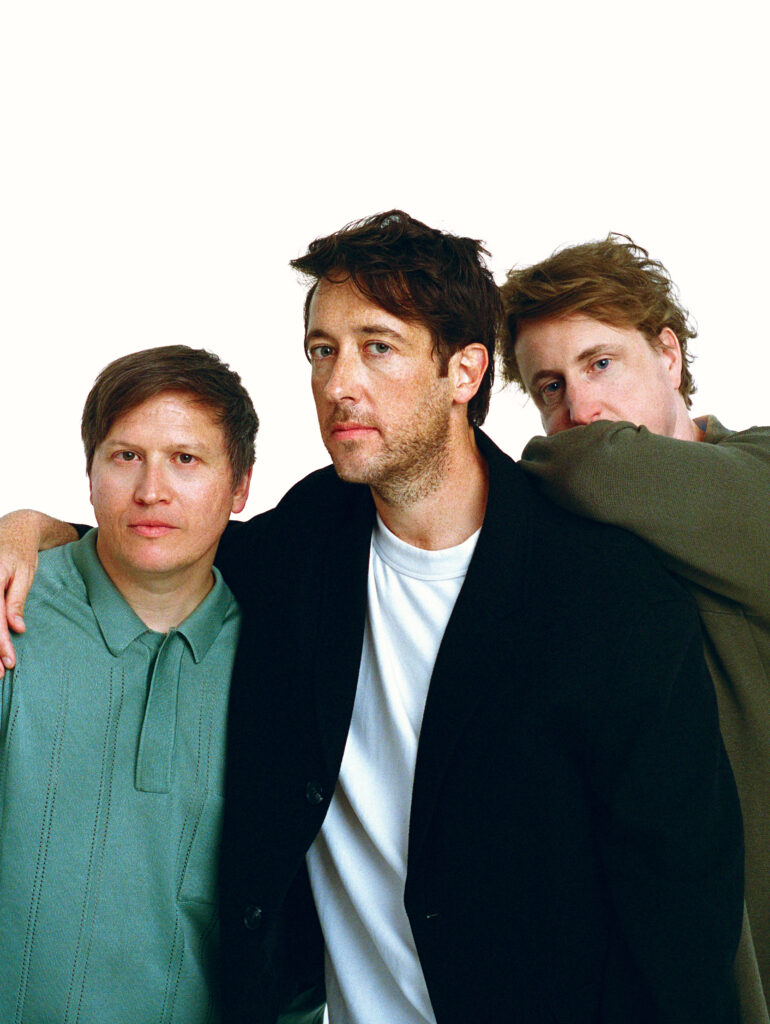
Anika: I would say you did come up with a very great result of this process you just explained.
Tord Øverland Knudsen: Yeah, wow, thank you.
Anika: To us, each album feels like its own era, because each one has a very distinctive sound. Is that something you actively pursue or does it happen naturally during the writing process?
Tord Øverland Knudsen: Yeah, I feel like it just starts. Whenever we start writing new songs, I often feel like we go sometimes very far away from what we did on the last album, sound wise. I remember after the first album, we were like, everything was going to be synths, there was no guitars on anything at all, it was very heavy if you had guitars or whatever. But we kind of start off very radically different and then it slowly but surely through the writing process comes closer to maybe the DNA of The Wombats. Because I feel like the songs and the structure and the hooks, you know, the memorable lyric, it’s pop songs essentially at the core of it. So we always seem to be finding a way back somehow. But then maybe at the song exchange, there is a lot of synths from that jamming or from that sort of wanting to do something completely different that kind of sticks a little bit. But then we mix it maybe with some of the more typical indie guitar sounding bits. It’s not deliberate necessarily, like super thought through that we change it up. It’s more out of necessity I think, that we’re like, „oh, we don’t want to repeat ourselves”, you know. And I think that’s more exciting a lot of the time. And whatever excites us is what we go with.
Carlotta: Yeah, I think we can feel that on the record. So you play bass for The Wombats. How do your songs come together? Are your parts usually built around the other instrumental parts or the lyrics? Or are there songs that started off with the bass lines?
Tord Øverland Knudsen: I mean every song is different. Sometimes a bass line is something that comes through like a jam or whatever. It’s just like, okay, this thing that we were just jamming on or whatever sounds good and that’s the bass line. Sometimes it’s just an acoustic guitar, a song that has some chords and then I’m thinking how you can build around that to make it a bit more interesting or to move around there but don’t get in the way. Maybe help the vocals more. I think a lot of the time it’s about what benefits the song. That’s always the end goal of it but sometimes it’s not even me playing bass, you know, like for „Blood on the Hospital Floor“ on the new album I played drums when we were jamming that and Murph was playing bass and Dan was on guitar. So sometimes you just change it up, just to make it a bit more interesting. Or sometimes the backing track that Dan started on or whatever. Or Murph comes with a pretty much ready song and then we’re kind of like, let’s try to tweak whatever’s already on there. I wouldn’t say there is a specific way but I always like songs that are quite bass heavy and I think that’s a big part of The Wombats in the sense that we’re only three people on stage as well. So it’s being a three piece, the bass is kind of the second guitar as well. It leaves more room maybe to be creative and to fill in the gaps and to do a bit more, than if it was like a six piece band or whatever, where you have a much larger sort of sound.
Carlotta: Yeah, you’ve already mentioned the bass heavy songs. Do you have a favourite song to play live or even one you are secretly tired of playing? We noticed that „Jump into the Fog“ is not on the setlist anymore.
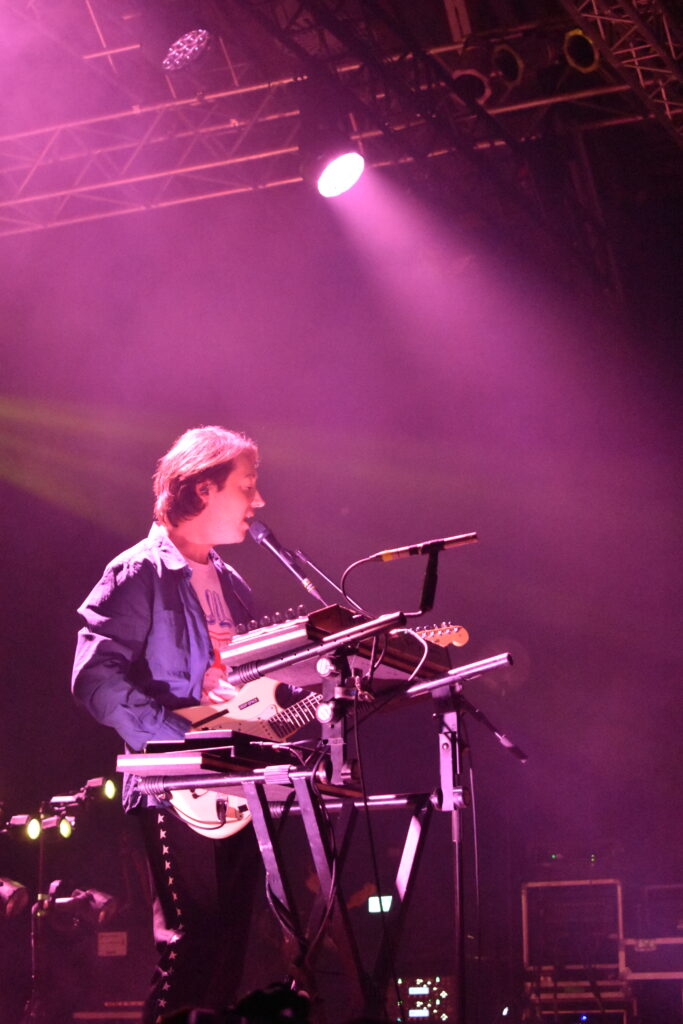
Tord Øverland Knudsen: Yes, it’s just, we’re on six albums and at some point it becomes a tough decision. The reason „Jump into the Fog“ is not on the setlist is because Murph can’t sing it. It’s too high. So if we were to play it, we’d have to put it down and we haven’t had a chance to do that yet. I’m sure we will do that at some point. The same with „Give Me A Try“. That’s another one that we haven’t played for a long time for the same reason, you know, we were a bit younger back then. So the vocal range has gone a little bit down, which is only natural. But yeah, bass lines. Yeah. Sorry, is that what I was talking about?
Carlotta: Your favourite song to play live.
Tord Øverland Knudsen: That was it, sorry. No, I really like playing „Blood on Hospital Floor“ for the moment. And I like playing „I Love America but She Hates Me“. It’s very bassy. It’s the same riff through the whole song, but again, it’s fun to play. And „Moving to New York“ has always been a favourite, but at the same time, it’s fast, so my arm goes a bit numb. But I guess that’s some other favourites. But I like playing it. I like playing all of the songs.
Anika: It’s a mix of old and new songs, kind of.
Tord Øverland Knudsen: Yeah, yeah, for sure.
Anika: When it comes to your setlists, you guys never miss, we would say as fans. And maybe by now you know how your shows work and which songs work best and there are obviously a few new songs we’re very excited to hear tonight. When creating the setlist, do you stick to certain criteria?
Tord Øverland Knudsen: No, I think it’s important that the fans and the crowd gets what they want, you know, we’re never going to be that band that’s like, okay, we’re not gonna play our biggest song because we think we’re bored of playing it or whatever. I think that’s just nonsense. I think you want to give people what they want to hear, which is maybe the most streamed songs or most popular songs. And because it’s so many songs to choose from, it makes the decision a little bit easier. So we have a little email group about the most streamed songs. In different regions of course it’s different, songs that are popular, so maybe we change it slightly for different places, but that’s sort of the basis. And then we need a calmer song or we need something to break it up a little bit, something that has a different structure or we need more songs from this and this album, just to make it a bit more equal or whatever. So it gets harder when you got more albums and a lot of songs to choose from. But at the moment I think the setlist is working great. I mean, hopefully you will enjoy it.
Anika: I’m sure we will. We had a peek at it.
Tord Øverland Knudsen: Yeah, okay, it’s going to be the same as we had in Berlin last night and stuff. So hopefully it won’t disappoint you.
Anika: After roughly 20 years, what’s something you take away from all this time of being in the band, music wise or even on a more personal level?
Tord Øverland Knudsen: Well, in the beginning we were just like, „this could be our last tour“, you know, a lot of bands at the same time as us had like a big moment and then this kind of like wearing off and then a lot of the bands don’t exist any longer. And I think now it’s become very much a job, and a reliable job as well, because we’ve been doing this for nearly 20 years. So it’s not just like we did one album that became popular and then not much happened since, you know, we kind of managed to maintain some sort of level, I suppose. But still, it’s always that sort of like never take anything for granted. I think it’s always there in the back of our heads, I think, and just feels super privileged that we are still doing what we did nearly 20 years ago now that we can still do that, you know, can still come to Münster and sell out the show here. That’s unbelievable, that it can still happen after all these years. So, yeah, not taking anything for granted. And the work ethics are the same as when it was in the early days. We are maybe a lot more sensible now, I think. That’s one thing that we learned through maybe failing, I suppose, like making touring a lot harder for ourselves with late nights and partying and stuff like that. We don’t do that anymore. Murph’s been to the gym before the show to get him prepped for it and most people don’t drink on the tour. Although I like a glass of wine from time to time but it’s a lot more sensible and everything is about making the show as good as it can be and it’s a nice place to be when it’s come to that point.
Anika: Yeah, I can imagine. And it makes sense that over the time you just slow down a bit.
Tord Øverland Knudsen: Yeah, but we don’t slow down with the shows, the shows are longer, the energy is the same, but it’s more about loading all that energy, mentally, physically, all of it into the hour and 45 that we’re on stage, you know. So rather than burning that out on a night out or what I would now maybe think of as silly ways of using the energy, you know. But I mean, I do like a night out from time to time, as I said, but it’s more on days off.
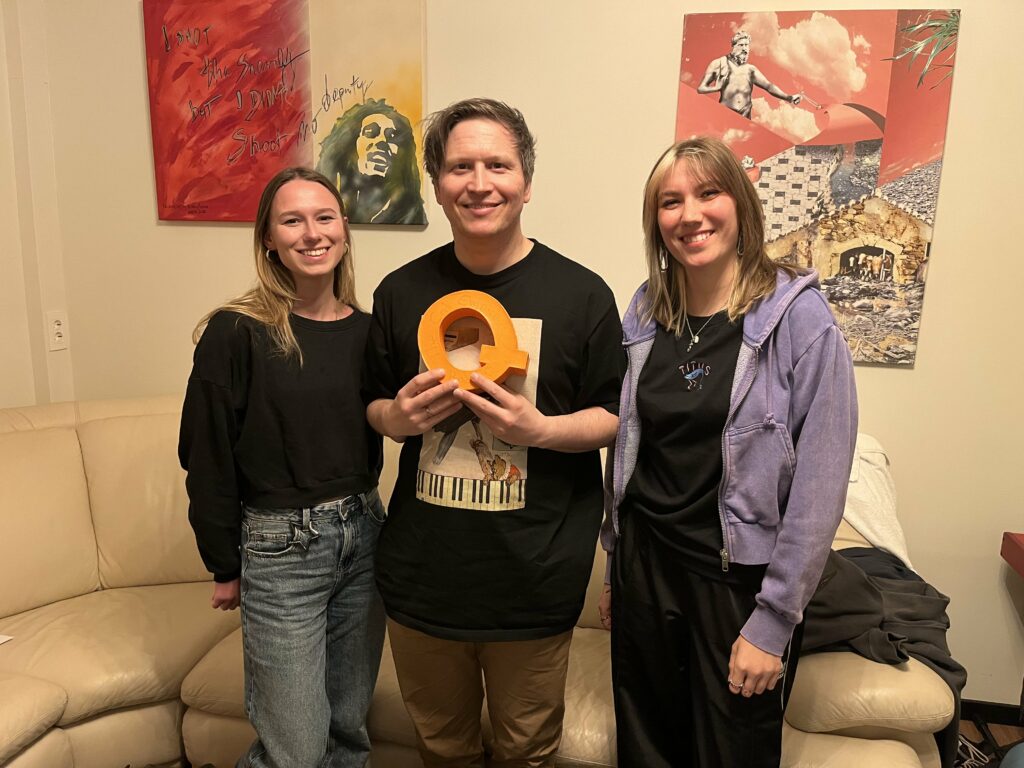
Anika: Yeah, definitely. That makes sense. Now onto the last question we have for you. Which music discovery have you recently made that you would like to share?
Tord Øverland Knudsen: Oh, that’s a tricky one. I don’t really listen to that much new music, to be honest, but I mean, I really enjoyed – but this is on everyone’s radar, I think – the Fontaine’s D.C. Record. I really like that. And this is not a discovery, Everything Everything was supporting us in the UK, but I’ve been liking their music for a long time, so it’s not really a new discovery but if it’s new for some, for people listening to this, then they should check out Everything Everything and the Fontaine’s D.C. record. There’s a band called Divorce that I was listening to the other day that I thought sounded pretty cool and they’re from Nottingham. That’s a very new band. So maybe that will be my recommendation of a super new band that people can check out.
Anika: Okay, thank you we’ll definitely have a listen.
Tord Øverland Knudsen: Yeah.
Anika: Thank you so much for your time. We are very excited for the show, and I hope you enjoy it.
Tord Øverland Knudsen: Yeah. Nice one. Thanks for having me.
